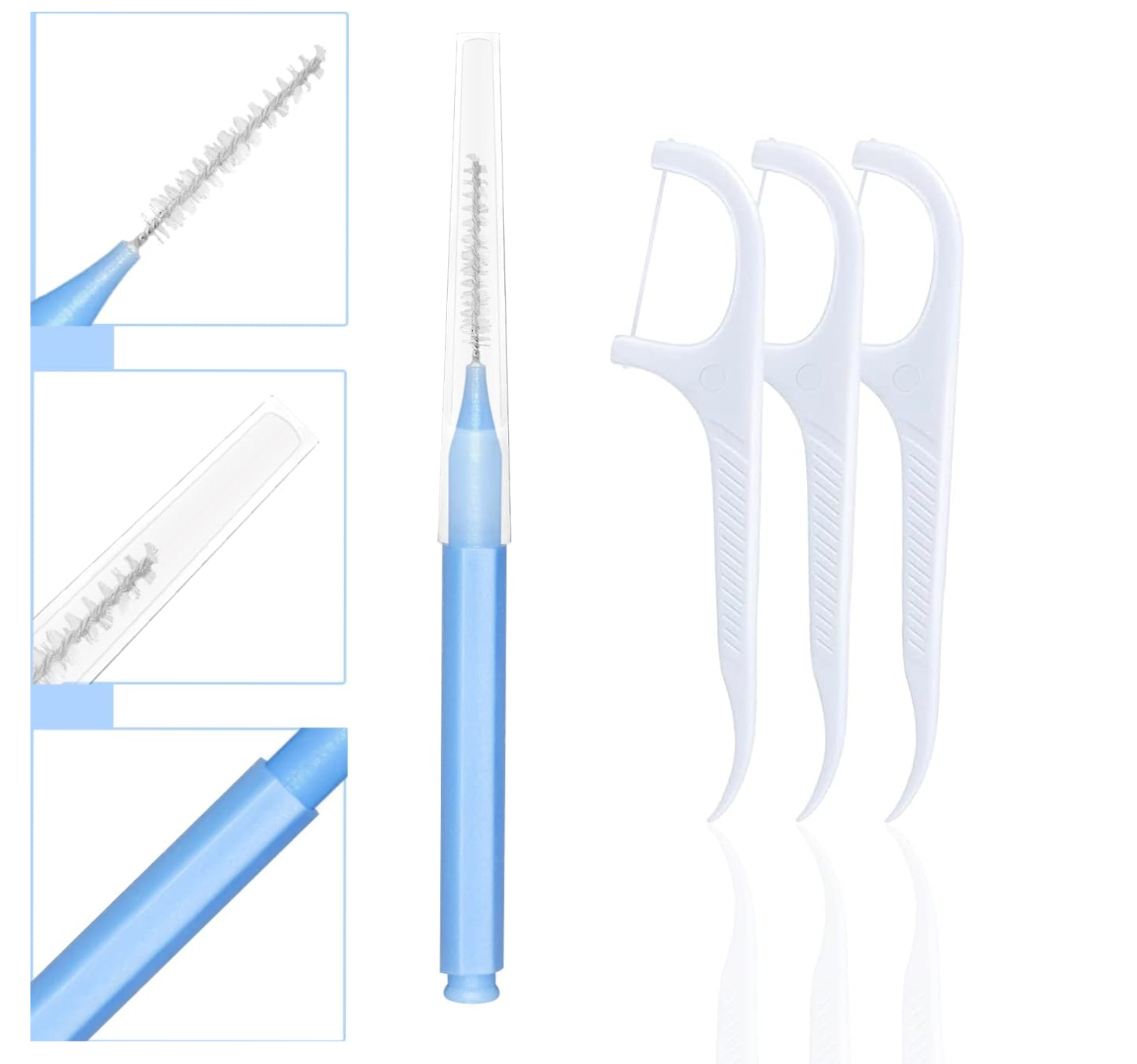Regular tooth brushing is a must as it cleans your tooth surfaces, but what about those tight spaces between your teeth- Those hard-to-reach areas in your mouth? This is where the use of flossing and interdental brushes comes into play. Two common tools for cleaning those tight spaces between teeth are floss and interdental brushes, but often patients usually ask- Which is better? In this post, we’ll be discussing the pros and cons of each method to help you make an informed decision about your oral care routine.
What Is Flossing and How Does Flossing Work?
You’ve probably heard about dental floss, but do you know what it does for your teeth and gums? Well, Flossing involves using a thin piece of dental floss to clean or dislodge food debris and plaque between teeth and along the gumline. It’s a convenient and portable method that can be done almost anywhere. Floss can reach tight spaces and remove plaque and food particles effectively. Regular flossing can also help prevent gum disease and cavities.
Dental floss might seem like a small thing, but its impact on your oral health is big. So, the next time you’re tempted to skip flossing, remember the amazing work this little tool does for your smile.
Why You Should Use Dental Floss
When you eat, tiny bits of food get stuck between your teeth. If these particles aren’t removed, they can attract bacteria, which form a sticky film called plaque. Plaque isn’t your friend – it’s the main cause of cavities and gum disease. Here’s where dental floss steps in. Flossing helps to dislodge those stubborn food particles and remove plaque buildup. It makes your teeth and gum stay clean and healthy.
What are the advantages of Flossing?
These are the advantages of flossing
1: Effective at removing plaque and debris from tight spaces.
2: Floss is widely available and tends to be less expensive than interdental brushes.
3: Floss is compact and easy to carry, allowing you to maintain your oral hygiene routine, even when you’re on the go.
What are the disadvantages of Flossing?
The advantages of Dental floss include the following
1: Requires manual dexterity, which can be challenging for some.
2: May cause bleeding or discomfort, especially if not done correctly.
3: Might not be as effective for people with braces or dental work.
What are Interdental Brushes and How Do They Work?
Interdental brushes, also known as interproximal brushes, are small bristled brushes designed to clean between teeth and around dental work, where traditional toothbrushes and even floss might struggle to reach. They come in various sizes to accommodate different gap sizes between teeth. Interdental brushes can be particularly useful for those with braces, bridges, or larger gaps between teeth.
They work by gently sliding between your teeth, effectively removing plaque, food particles, and debris that tend to accumulate in these tight spaces. The bristles of the brush are soft, yet durable, ensuring that they effectively clean without causing damage to your gums or enamel.
What are the advantages of Interdental Brushes?
The following are the disadvantages of Interdental Brushes
1: Ideal for cleaning around braces, dental implants, and other dental work.
2: The soft bristles of interdental brushes are generally gentle on gums, reducing the risk of irritation.
3: Interdental brushes come in various sizes to accommodate different tooth gaps, providing a more customized cleaning experience.
What are the disadvantages of Interdental Brushes?
1: The disadvantages of interdental brushes include the following
2: May not fit into very tight spaces as effectively as floss.
3: Can be less portable compared to floss.
4: Slightly more expensive than traditional floss.
Interdental Brushes vs. Dental Floss- Which Is Better?
The choice between flossing and interdental brushes depends on your personal preferences and needs. Both dental floss and interdental brushes are valuable Oral care products for removing plaque and food particles between teeth. If you have dental work like braces or bridges, interdental brushes might be more suitable. On the other hand, if you’re comfortable with flossing and have tight spaces between teeth, traditional floss could be your go-to option.
Where to Buy Interdental Brushes and Dental Floss- Ekong Smile Oral Care?
If you’re looking for the best interdental brushes and dental floss on the market, consider Ekong Smile Oral Care Product. With a reputation for producing high-quality oral care products, Ekong Smile offers a range of interdental brushes and dental floss options to suit your needs. From traditional waxed floss to advanced varieties infused with fluoride or flavours, Ekong Smile has got you covered. Remember, whichever method you choose – flossing or interdental brushes – the key is consistency. Regularly cleaning between your teeth is a vital step in maintaining optimal oral health and a radiant smile.
The fact is that The “better” choice between flossing and interdental brushes varies from person to person. The key is to choose a method that you’re comfortable with and can incorporate consistently into your oral hygiene routine. Whether you opt for flossing, interdental brushes, or a combination of both, the most important thing is to prioritize regular and thorough cleaning between your teeth for a radiant smile and excellent oral health. Always remember to contact Ekong Smile manufacturer for your quality Oral care products.

